May/June 2018
Happy Summer! The warm weather has brought us many changes. We held the 2018-19 Fellows’ Orientation, welcomed new team members, and began saying goodbye to some of the 2017-18 fellowship class. In 2018-19, we will have 51 Fellows in 14 countries. We also welcomed seven new host organizations to the PiAf family: Healthy Kids/Brighter Future, Last Mile Health, More Than Me, The Nyaka AIDS Orphans Project, Spark MicroGrants, Student Sponsorship Program, and the WARC Group.
Amidst the orientation excitement, we said a bittersweet goodbye to our Program Director of eight years, Stephanie Hooper Leroy. In the same breath, we celebrated our Program Manager, Michelle Spada’s, growth into the position of Program Director. We also welcomed our newest team member, Rachana Gangavarapu, as the Program & Communications Associate.
We hope the summer treats you well and that you enjoy this month’s edition of the Fellows Flyer!
PiAf Connections
Please click below to check out pictures of our Fellows, Alums and other members of the PiAf family meeting up at home and around Africa.
Notes from the Field
By Hannah Bennett, 2017-18 Fellow with BIPAI in Swaziland
From Development to Resource Mobilization
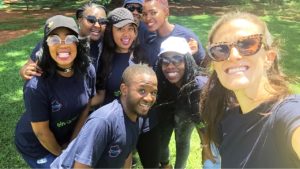
Social work and nursing staff at the clinic’s annual team building sports day and Christmas Party.
Baylor College of Medicine Children’s Foundation Swaziland needs no introduction in the community where I reside. Everyone throughout the country knows “Baylor” despite the many names associated with our NGO’s network of organizations spanning from Texas to Romania to Swaziland. The Centre of Excellence is a title we carry proudly, as the life-saving work done by our many doctors, nurses, researchers, social workers, and programs staff in the realm of pediatric and maternal HIV is unparalleled in the region, caring for nearly half of all children on anti-retrovirals in the country with the highest prevalence of HIV in the world.
Baylor has long held a position of high esteem internationally as a leading capacity builder and mentoring organization with a proven track record of clinical and programmatic success and abundant community support, to the extent that our services more or less speak for themselves within the region. As a result of this strong reputation, prior to this year, we never had staff dedicated exclusively to Resource Mobilization and Development. My fellowship was designed primarily to concentrate efforts to deepen and diversify support for Baylor’s services and communicate our current impact. Though I initially wrestled with the optimal approach to designing development and communications strategies and managing a brand new fundraising committee as a temporary employee and cultural outsider, I experienced a significant turning point one day while reflecting on my discomfort with the word “development”. Though “development” is the colloquial term in the field, that’s not what I do every day, and that doesn’t sufficiently or respectfully convey the amazing growth that Baylor is experiencing right now; this work is better framed through the lens of my title, “resource mobilization”.
When I zoom out, I gain important perspective about how the many diverse things I do every day tie together. I often bounce between activities like writing research grants for young adult transitional services, designing new programs for HIV-positive pregnant mothers, liaising with clinical staff to conduct needs assessments for cervical cancer screenings, and forming new community partnerships to amplify the voices of young women to streamline reproductive health services. All of these activities allow me to draw from a wealth of resources, such as the documented clinical expertise of BIPAI, anecdotal feedback of patients from healthcare workers, the diverse strengths of colleagues and executive administration, and the collaborative power of eSwatini’s NGO network.
The value of this wide array of resources struck me while assembling a team for a grant for caregiver support for orphans living with HIV as I struggled to narrow down a list of colleagues with unique expertise to contribute. This strengthened my belief that it’s not “development” work that happens in any Princeton in Africa fellowship organization, because that would imply that a Fellow’s purpose is simply to build without a foundation. Instead, the approach embedded in the more aptly named “resource mobilization” enhances every connection between existing organizational strengths. Even while finding our footing as a new team and new initiative altogether, I feel Baylor’s capacity for impact growing as we re-imagine the boundaries of our roles across departments, creatively map community support to fill programmatic gaps, and elevate our amazing daily work in the provision of comprehensive health services for Swazi families.
Notes from the Field
By Morgan Wack, 2017-18 Fellow with CHAI in South Africa
Numbers and Narratives
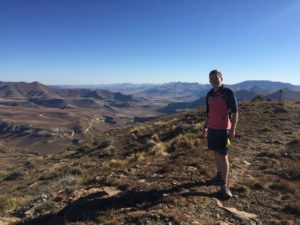
View from Wodehouse Peak in South Africa’s Golden Gate Highlands National Park.
On March 27th, a group of roughly thirty people piled into a non-descript room on the fourth floor of South Africa’s National Department of Health headquarters. Each attendant had come to discuss the details of the National Voluntary Medical Male Circumcision (VMMC) Program. As a representative from Clinton Health Access Initiative (CHAI) at this bi-weekly Technical Working Group, I waited to present my team’s findings on the uptake rate of circumcision across the South African VMMC Program’s 9 active provinces, 28 active districts, and 1,288 active VMMC sites.
Armed with a bland USB drive and an even blander Power Point presentation, I scanned through my slides. As I remarked on the monthly performance rates, I became transfixed with the unimaginably large numbers in front of me: 300,000 circumcisions over four months, 600,000 for the year, 3.4 million over the past eight years. When weekly field updates deal not in the tens or hundreds, but in the tens of thousands, it can be difficult to delineate between the numbers and the people they represent. I was suddenly acutely aware of how the data I was discussing could, and often does, obscure the individual decisions of our patients, who each elect to sacrifice their own time, money and temporary safety to protect themselves and their loved ones.
As I returned to my seat, the voices behind each of these numbers bounced around in my head. Struggling with the distance between our policies and the people they impact, I volunteered to visit local VMMC sites in the southern province of KwaZulu-Natal. At each clinic, I discussed the procedure and what it meant to the individuals I previously encountered as numerical values. While some were hesitant to discuss circumcision with a random American visitor, many others spoke at length about why they had decided to undergo the procedure. Their answers ranged from a desire to remain safe, to the urging of their partners, to a few persuaded by sheer cosmetic preference.
Though each had his own unique story, their trust and belief in the safety and promise of the procedure reminded me of another figure: 432,000 or the estimated number of HIV infections averted by South Africa’s VMMC Program. Slowly I began to rectify this quantitative divide, realizing the indispensability of data-driven technologies and innovative reporting practices. Work at the national level can obscure the lives behind the numbers, but without constant analysis and iteration by organizations like CHAI, each client’s trust in the promise of national healthcare systems would collapse amidst a fog of misinformation, misdiagnoses, and improper interventions.
My fellowship placement has reminded me of the importance of both humanity and proficiency in global health. Without narratives and personal connections, the processes become opaque and distant. Yet without accurate data and the policies they dictate, the incremental improvements made by dedicated mobilizers, administrators, and clinicians would be overwhelmed by damage created by statistical ignorance and biased assumptions. My experience has taught me that it is the responsibility of the analysts and legislators involved in this process to bridge this gap, ensuring that the policies are not only effective but also compassionate.
Notes from the Field
By Liviya David, 2017-18 Fellow with HelpAge International in Kenya
On Being a Kind & Gracious Guest
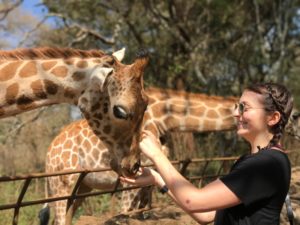
Liviya David feeding giraffes at the Giraffe Center in Nairobi.
It did not take long after my arrival in Nairobi to first encounter what it means to be a guest in Kenya. I am not talking about taking your shoes off at the door or bringing a gift for the host. It meant my taxi driver dropping me off from the airport, then quickly realizing that it was late and I did not have any food. He asked if I was hungry, then went above and beyond by taking me to the closest Chicken Inn, a lovely first meal in my new home. “Karibu (welcome to) Kenya,” I thought to myself.
I did not think much of that night until I started my Swahili classes a month later. One of the first words I learned alongside “thank you” and “good” was “guest” (mgeni). My teacher explained that having guests in Kenya is an honor. He went on to describe how most Kenyans’ Sundays are spent visiting friends and family and enjoying their time together.
I was once again aware of how it felt to be a guest when a friend invited me to go to his cousin’s house outside of Nairobi. We arrived, exchanged “nice to meet you” and such pleasantries and settled in. This was quickly followed by his cousin bringing out plates of fresh cut fruit, steaming chai tea, and homemade mandazis. She and I did not know each other but she wanted to ensure that I was comfortable, fed, and of course had tea to drink. I felt honored to be their guest.
I realized much before the start of my time in Kenya that I was a guest in this country, despite my work keeping me here for a year. Over the course of my fellowship, I have developed a deeper understanding of the immense power and privilege of being a visitor in a place where having guests is an honor. However, the question I often find myself reflecting upon is “What does it mean to be a good guest?”.
I do not have a complete answer, but I know that taking time to say hello to all of my coworkers every morning and asking about their families has gone a long way in showing my respect and forming meaningful relationships. It can also mean trying the soup that everyone in the office loves and laughing along with them when I realize they tricked me into trying soup made from a goat’s head (a Kenyan delicacy by the way). Most of all, it means listening more than I speak while being conscious of the space I occupy and that the way I talk to people and react to what they share with me—even if it is different than my experience—matters.
My fellowship year is coming to an end (too soon). I will take with me a newfound love for goat, chapati, and the rooster that wakes me up every morning—but most of all I will carry with me the importance of critically and intentionally considering what it means to be a kind and gracious guest.
Notes from the Field
By Sarah Pollnow, 2017-18 Fellow with the African School of Economics in Benin
Sharing a Meal, Building a Bond
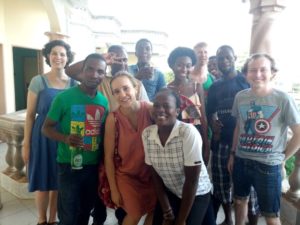
African School of Economics students invited the PiAf Fellows over for a meal on May 1st. Estelle, pictured front and center, cooked the amazing Cameroonian feast.
When preparing for my fellowship at the African School of Economics, one line of the handover notes caught my eye: “Traditionally, the Fellows have made dinner once a week and invited a few students over.” This—more than the prospect of teaching graduate students or acclimating to the hot Beninese weather—seemed destined to be a source of stress.
Eight months into my fellowship, my culinary self-esteem remains low. My bland dishes tend to involve more deconstruction (peeling, chopping, and straining) than actual preparation, and I have not yet attempted to cook any sources of protein. Nevertheless, the quality of the food seems almost incidental to the experience of the evening. These PiAf dinners are invariably a highlight of the week. Whether chatting about college life in our respective countries, swapping recipes, hearing stories of the great kings of Benin, or discussing our aspirations, I love the opportunity to get to know the students and my co-Fellows even better.
Still more memorable have been the opportunities to be a guest. Two of my coworkers/friends spent hours teaching me how to prepare akassa, which is a type of fermented corn. They also prepared fish and a sauce légume, thereby revealing which leaves go into the mysterious vegetable sauce. Yet another colleague has promised to teach me how to prepare pâte, which is a bland and somewhat gelatinous carbohydrate that I have come to love this year.
Just two days ago, a group of students living at the ASE Residence invited my co-Fellows and me over for a May 1st holiday lunch. Several of the Cameroonians had prepared an amazing feast for all fifteen or so guests. As we savored the meat dishes and sampled the many ways to prepare bananas or plantains (boiled, smashed, cooked, and fried), a mixture of Nigerian and American music played in the background. I was overcome with gratitude for the amazing student community I’ve had the privilege of working with this year, and for the many meals shared.
Notes from the Field
By Meital Kupfer, 2017-18 Fellow with the International Rescue Committee in Uganda
It Feels Like Home – Kampala
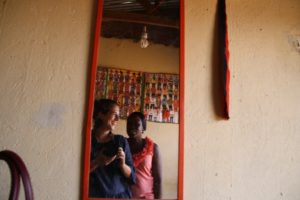
Joking around with Vitaline, an IRC co-worker, with the camera in between interviews with beneficiaries at the Tungane tailoring group, Nsambya-Kirombe.
At first glance, Kampala seems to be a maelstrom of winding streets, boda boda (motorcycle) drivers, matatus (taxis), cyclists, and cars – but there is a method to the madness. Throughout my past ten months working with the International Rescue Committee in its Uganda country program, my life has evolved to fit within this system.
I spend time travelling to the field to support our incredible programming in four different sectors (women’s empowerment, livelihoods, health, and protection) based in Karamoja, Arua, Yumbe, and Nsambya. While I greatly enjoy the time I spend in all those places, the time I spend in Nsambya, in southeast Kampala, reminds me of the diversity and resilience of the clients we serve in Kampala. There are over 100,000 urban refugees in Kampala, a mere twenty minute drive from our office. I’ve spent countless hours with our village savings and loans associations (VSLAs), interviewing incredible women such as El Presidento, a Congolese refugee who is the president of a collective of four savings groups! Our work is not just to support the emergency response for South Sudanese and Congolese refugees in Uganda, but also to highlight the resilience and innovation of urban refugees who face similar, but also different forms of adversity. Our Livelihoods Resource Centre (LRC) in Nsambya currently supports over 120 urban refugees by teaching tailoring, baking, and hairdressing business skills.
The streets of Kampala also represent the red dirt that often covers me from head to toe after thirty or so kilometers of mountain biking. Joining the Kampala Group of Bikers (KGB) in my first months here was an incredible way to intimately get to know the streets and dirt roads of the seven hills of Kampala – through races and casual rides. I’ve fallen countless times – including when my brakes gave out during a race in Sipi Falls – but I’ve picked myself up, fixed my chain, and continued, despite the highs and lows of working and living in these contexts.
Moving thousands of miles away from friends and family, I did not expect my career and personal life to merge in such a way in Kampala – creating a multi-faceted experience that may take me from rooftop choir sessions, the late-night music brainstorming sessions, my sukuma dancehall family, street-side grilled meat, and IRC savings group action audit celebrations. It feels like home.
Notes from the Field
By Shayla Reid, 2016-17 Fellow with Young 1ove in Botswana
Alumni Spotlight
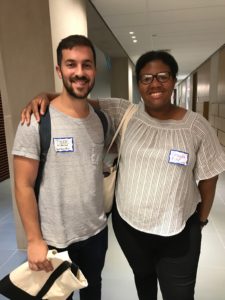
PiAf alumni Tyler McBrien (left) and Shayla Reid (right) at the 2018-19 Fellows’ Orientation.
One of the worst things about returning home, from abroad, is how quickly my old life can become very distant. The physical distance, change in time zones, and return to previous routines can easily and rapidly erode any sense that I had of my life in my former fellowship country. This is something I felt very strongly within a few months after returning from Gaborone, Botswana. Immediately after I got back, I started medical school at Northwestern. Before I knew it, I was immersed in a world that had very little mention of the continent and very little in common with my old life. It was disappointing to feel so disconnected from the values and mission of PiAf.
When I found out about the Orientation Alumni Coordinator post, I was excited to apply– here was an opportunity to not only reflect on my fellowship experience, but to connect with like-minded peers and encourage and support them prior to their own departures for their fellowship posts.
I had so much fun reconnecting with the PiAf team and getting to know the new Fellows! I was very impressed by this year’s class and their thoughtfulness. I was also surprised by the number of personal experiences and amount of advice I was able to share during the orientation programming with the 2018-19 Fellows– it illuminated just how much I had learned from my fellowship year. Being a coordinator left me feeling inspired and rejuvenated– exactly what I had hoped for when first applying.
About Shayla:
Shayla was a 2016-2017 PiAf Fellow with Young 1ove in Gaborone, Botswana, where she worked on youth health and education as a Curriculum Fellow. After her fellowship, she started medical school at Northwestern University’s Feinberg School of Medicine. Shayla has a passion for sexual and reproductive health and health equity. As a physician-in-training, she hopes to work with underserved populations both domestically and globally, infusing social justice and advocacy into her practice. She graduated from Princeton University in 2015, majoring in Spanish and Portuguese Languages and Cultures, with minors in Latin American Studies and Global Health & Health Policy. Most recently, Shayla was the Princeton in Africa Alumni Coordinator for the 2018-2019 Fellows’ Orientation.





